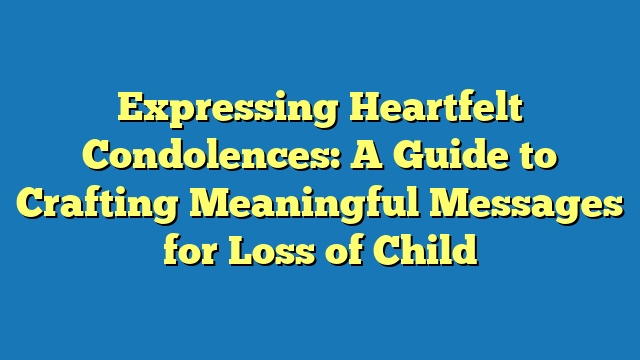A condolences message for loss of child is a heartfelt expression of sympathy and support extended to grieving parents who have lost their child. These messages aim to provide comfort, acknowledge the pain, and offer words of hope during a difficult time.
Condolence messages can be particularly meaningful as they serve as a reminder that the bereaved are not alone in their sorrow. They offer solace, strength, and a sense of community during a period of immense grief. Historically, such messages have been an integral part of mourning rituals across cultures and religions, providing comfort and support to those who have experienced the profound loss of a child.
This article will explore the various aspects of condolences messages for loss of child, including their significance, appropriate language and tone, cultural considerations, and thoughtful gestures that can accompany these messages.
Condolence Messages for Loss of Child
Condolence messages for loss of child serve a vital role in providing comfort and support to grieving parents. Understanding the essential aspects of such messages is crucial for crafting heartfelt expressions that resonate with the bereaved.
- Empathy
- Sincerity
- Brevity
- Respect
- Avoidance of Clichs
- Cultural Sensitivity
- Offer of Support
- Memory Sharing
Empathy and sincerity are central to any condolence message. While brevity is important, it should not come at the expense of heartfelt expression. Respect for the grieving family’s privacy and cultural beliefs is essential. Avoiding clichs and offering tangible support can make a meaningful difference. Sharing fond memories of the child can provide comfort and help keep their legacy alive.
Empathy
Empathy is the cornerstone of any meaningful condolence message for loss of child. It requires the ability to step into the shoes of the grieving parents and experience their pain, even if only to a limited degree. Empathy involves understanding their emotions, acknowledging their loss, and expressing genuine care and concern.
-
Emotional Resonance
Empathy begins with recognizing and aligning with the emotions of the bereaved. This involves understanding their profound grief, sorrow, and sense of loss. -
Active Listening
Active listening is essential for demonstrating empathy. It requires giving the grieving parents space to express their feelings, listening attentively, and validating their emotions. -
Avoidance of Judgment
Empathy entails avoiding judgment and criticism. Instead, it involves accepting the grieving parents’ emotions without dismissing or downplaying them. -
Respect for Boundaries
Empathy also involves respecting the boundaries of the grieving parents. It means understanding that they may need time and space to process their loss and that their responses may vary.
By incorporating these facets of empathy into their messages, individuals can provide genuine comfort and support to bereaved parents during their darkest hours. Empathy allows them to connect with the grieving on a deeper level and offer meaningful expressions of care and compassion.
Sincerity
Sincerity is a fundamental aspect of any meaningful condolence message for loss of child. It involves expressing genuine empathy, care, and concern, without any pretense or artificiality. Sincerity is essential because it allows the grieving parents to feel seen, understood, and supported during their darkest hours.
A sincere condolence message comes from the heart and is not simply a formality or obligation. It is a personal expression of sympathy that conveys a deep understanding of the pain and loss that the grieving parents are experiencing. Sincerity can be conveyed through the choice of words, the tone of the message, and the overall effort put into crafting a meaningful expression of support.
Real-life examples of sincerity in condolence messages for loss of child include:
- “I am so deeply sorry for the loss of your precious child. I cannot imagine the pain you must be going through.”
- “Your child was a beautiful soul, and I will always cherish the memories I have of them. I am here for you if you need anything at all.”
- “I know words cannot express your pain, but I want you to know that I am thinking of you and your family during this difficult time.”
Understanding the importance of sincerity in condolence messages for loss of child has practical applications in helping bereaved parents cope with their grief. When grieving parents receive sincere messages of support, they feel less alone and more understood. This can help them to process their emotions, begin to heal, and find strength to carry on.
In conclusion, sincerity is a critical component of any effective condolence message for loss of child. It allows grieving parents to feel seen, understood, and supported during their darkest hours. By crafting sincere messages of sympathy, individuals can provide meaningful comfort and help bereaved parents navigate their grief.
Brevity
Brevity is a crucial component of effective condolence messages for loss of child. When faced with such a profound loss, grieving parents may find it overwhelming to read lengthy messages. A concise message allows them to quickly absorb the expression of sympathy without feeling burdened.
Brevity does not imply a lack of depth or sincerity. Instead, it requires careful selection of words that convey empathy, support, and comfort. Real-life examples of brevity in condolence messages for loss of child include:
- “My heart aches for your loss. I’m here if you need anything.”
- “Your child was a precious gift. May their memory bring you peace.”
- “I will keep your family in my thoughts and prayers.”
Understanding the importance of brevity in condolence messages for loss of child has practical applications in helping bereaved parents cope with their grief. Concise messages allow them to focus on their emotions and the support being offered, rather than becoming overwhelmed by lengthy text.
In conclusion, brevity is a vital aspect of effective condolence messages for loss of child. It allows grieving parents to quickly absorb the expression of sympathy and support, without feeling burdened. By crafting brief and meaningful messages, individuals can provide comfort to bereaved parents during their darkest hours.
Respect
Respect is a fundamental aspect of any meaningful condolence message for loss of child. When expressing sympathy to grieving parents, it is essential to approach them with the utmost respect for their emotions, beliefs, and boundaries. Respectful condolences acknowledge the sanctity of their loss and provide support without imposing or overwhelming them.
Real-life examples of respect in condolence messages for loss of child include:
- Recognizing the parents’ right to grieve in their own way and at their own pace.
- Avoiding intrusive questions or attempts to offer simplistic solutions.
- Using respectful language that acknowledges the magnitude of the loss.
Understanding the importance of respect in condolence messages for loss of child has practical applications in helping bereaved parents cope with their grief. When grieving parents feel respected, they are more likely to open up and share their emotions. This can help them to process their loss, begin to heal, and find strength to carry on.
In conclusion, respect is a critical component of any effective condolence message for loss of child. It allows grieving parents to feel seen, understood, and supported during their darkest hours. By crafting respectful messages of sympathy, individuals can provide meaningful comfort and help bereaved parents navigate their grief.
Avoidance of Clichs
In crafting meaningful condolence messages for loss of child, it is essential to avoid using clichs. Clichs are overused and generic phrases that can come across as insincere or dismissive of the profound grief experienced by the bereaved parents.
-
Uniqueness of Grief
Every grieving process is unique, and clichs fail to capture the depth and individuality of each parent’s experience. Instead, focus on acknowledging the uniqueness of their loss and offering personalized words of comfort.
-
Emotional Authenticity
Clichs often lack emotional depth and can fail to convey genuine empathy. Strive to express your condolences in a sincere and heartfelt manner, using language that resonates with the parents’ emotions.
-
Respect for Boundaries
Clichs can sometimes overstep boundaries by implying that you fully understand the parents’ pain. Respect their need for space and privacy, and avoid using phrases that may minimize their grief.
-
Offer of Support
Rather than relying on empty platitudes, focus on offering specific and practical support to the grieving parents. Let them know that you are there for them in whatever way they need, whether it’s running errands, providing meals, or simply listening.
By avoiding clichs and crafting personalized and heartfelt messages, we can provide meaningful comfort and support to grieving parents during their darkest hours.
Cultural Sensitivity
Cultural sensitivity is a critical aspect of crafting meaningful condolence messages for loss of child. Different cultures have unique beliefs, rituals, and practices surrounding death and mourning, and it is essential to be respectful of these variations when expressing sympathy.
One of the key reasons cultural sensitivity is important is that it allows us to avoid causing offense or distress to grieving parents. By understanding and respecting their cultural background, we can ensure that our words and actions are appropriate and supportive.
For example, in some cultures, it is customary to avoid talking about the deceased child directly, while in others, it is considered comforting to share memories and stories about the child. By being aware of these cultural differences, we can tailor our messages accordingly.
In conclusion, cultural sensitivity is a vital component of effective condolence messages for loss of child. It allows us to provide support and comfort to grieving parents in a respectful and meaningful way.
Offer of Support
In the face of unimaginable loss, an offer of support can be a beacon of hope for grieving parents. Condolence messages for loss of child should not only express sympathy but also provide tangible ways to help the bereaved navigate their darkest hours.
Offering support in a condolence message goes beyond mere words. It involves acknowledging the parents’ pain, respecting their boundaries, and providing practical assistance. Real-life examples of support in condolence messages include offering to run errands, cook meals, provide childcare for other children, or simply listen without judgment.
Understanding the importance of offering support in condolence messages has practical applications in helping bereaved parents cope with their grief. When parents feel supported, they are more likely to open up about their emotions, seek help when needed, and gradually rebuild their lives. Support can provide a sense of community and belonging, reminding the grieving parents that they are not alone during this difficult time.
In conclusion, offering support is a critical component of meaningful condolence messages for loss of child. It provides practical assistance, emotional comfort, and a beacon of hope for bereaved parents as they navigate their grief. By incorporating thoughtful and compassionate offers of support into our messages, we can make a tangible difference in their lives.
Memory Sharing
In the realm of condolence messages for loss of child, memory sharing holds a significant place. It involves conveying heartfelt words that acknowledge and honor the memory of the deceased child, providing comfort and solace to the grieving parents.
-
Evocation of Fond Memories
Sharing fond memories of the child can evoke cherished moments and bring a sense of comfort. It can involve recalling the child’s laughter, their favorite activities, or their unique qualities.
-
Validation of the Child’s Existence
Memory sharing validates the existence and impact of the child’s life. It acknowledges the pain of their absence while also celebrating the joy and love they brought to the world.
-
Connection with Others
Sharing memories can foster a sense of connection between the grieving parents and others who knew and loved the child. It creates a shared space where they can collectively remember and honor the child’s life.
-
Hope and Healing
Memory sharing can offer a glimmer of hope and aid in the healing process. It reminds the grieving parents that while the child may be physically gone, their memory and the love they shared will continue to live on.
Incorporating memory sharing into condolence messages for loss of child is a powerful way to provide comfort, acknowledge the child’s life, and offer a sense of hope and healing to the grieving parents. By choosing words that evoke fond memories and celebrate the child’s unique spirit, we can help the bereaved navigate their grief and find solace in the cherished memories of their beloved child.
FAQs
This section addresses common questions and concerns related to crafting meaningful condolences messages for loss of child.
Question 1: What is the most important aspect of a condolences message for loss of child?
Empathy is crucial. Understand and acknowledge the profound grief of the bereaved parents, and express genuine care and support.
Question 2: How can I offer support in a condolence message?
Go beyond words. Offer specific, practical assistance such as running errands, providing meals, or simply listening without judgment.
Question 3: Is it appropriate to share memories of the child in a condolence message?
Yes, sharing fond memories can provide comfort and solace. Recall the child’s laughter, favorite activities, or unique qualities.
Question 4: How should I respond if the bereaved parents do not want to talk about their loss?
Respect their boundaries. Let them know you are there for them if they need to talk, but avoid pressuring them.
Question 5: Can I send a condolence message to someone I don’t know well?
Yes, even a brief message expressing sympathy and support can be meaningful. Keep it sincere and respectful.
Question 6: How can I avoid saying the wrong thing in a condolence message?
Avoid clichs, platitudes, or dismissive language. Focus on acknowledging the parents’ pain and offering genuine support.
These FAQs provide key insights into the delicate task of crafting condolences messages for loss of child. They emphasize empathy, support, respect, and the power of memory sharing. As we delve deeper into this topic, we will explore additional aspects and nuances to help you create meaningful and comforting messages during times of profound grief.
Tips for Crafting Meaningful Condolence Messages for Loss of Child
Crafting a heartfelt condolence message for loss of child requires sensitivity, empathy, and a genuine desire to provide comfort. Here are some detailed tips to help you create meaningful messages that resonate with the bereaved parents:
Express Sincere Empathy: Acknowledge the profound pain and grief of the parents without using clichs or dismissive language. Let them know that you understand their sorrow, even if you cannot fully comprehend it.
Offer Specific Support: Go beyond general expressions of sympathy. Offer practical assistance such as running errands, cooking meals, providing childcare, or simply listening without judgment.
Share Fond Memories: If appropriate, share fond memories of the child. Recall their laughter, favorite activities, or unique qualities. This can provide comfort and help keep the child’s memory alive.
Respect Boundaries: Understand that the bereaved parents may need time and space to process their loss. Respect their privacy and avoid overwhelming them with excessive contact.
Avoid Platitudes: Clichs and generic phrases can come across as insincere or dismissive. Instead, focus on expressing your genuine condolences and support in a personal and heartfelt way.
Be Patient: Grief is a complex and ongoing process. Be patient with the bereaved parents and continue to offer your support over time.
By incorporating these tips into your condolence messages, you can provide meaningful comfort and support to grieving parents as they navigate their darkest hours.
In the concluding section of this article, we will delve deeper into the significance of these tips and explore how they contribute to the overall impact of condolence messages for loss of child.
Conclusion
Crafting meaningful condolences messages for loss of child requires empathy, sensitivity, and a genuine desire to provide comfort. This article has explored various aspects of such messages, emphasizing the importance of expressing sincere empathy, offering specific support, and sharing fond memories.
Two key points to remember are: 1) respecting the boundaries of the bereaved parents and 2) avoiding clichs or platitudes that may come across as insincere. By incorporating these elements into our messages, we can provide meaningful support and help grieving parents navigate their darkest hours.









Tips for Using "Template by Kevin Crafts" Comments for Meaningful Online Discussions